
G-MAN
-
Posts
663 -
Joined
-
Last visited
Never
Posts posted by G-MAN
-
-
I thought the 'registered' guns were .44 Rem Mag. Those cartridges sure aren't .44 Rem Mags!
Wayne
Actually, the Registered Magnums were the original 357 Magnums made from 1935 to roughly 1940. They were hand assembled and made to order only.
Whoever hastily put together that display at the NRA museum just tossed in a few Hollywood multi-caliber blank cartridges, which is what's in the picture.
-
Currently on display at the NRA museum. Note the jeweling on the trigger flat and the Roper grips. Someone over on the S&W forum said that it may have actually shipped from S&W with the Ropers if he ordered it that way. There has been at least one documented RM that shipped with Ropers and Gable's may be another.


-
I'm starting to get used to the double action LCR. I mainly shot the S&W 19 today, but I did try one "close engage" rapid fire drill with the LCR at 7 yards.
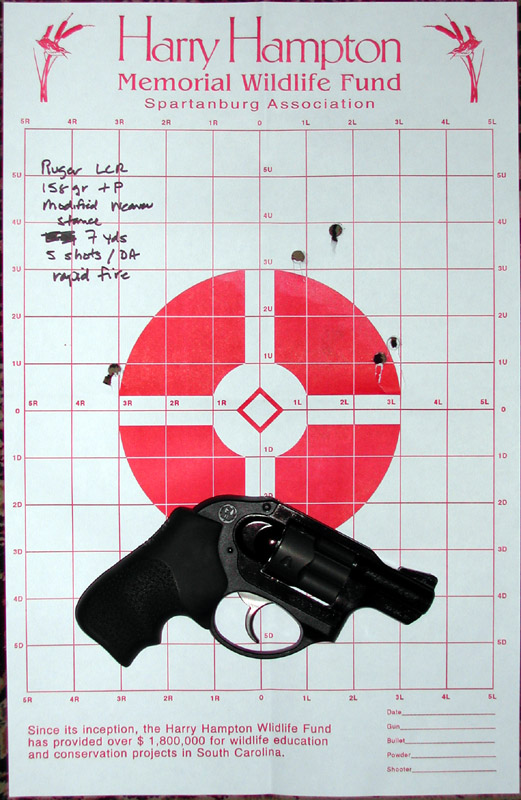
-
I posted in another thread about digging my thirty-year-old 19-4 out and getting it cleaned up. This was the first handgun I ever purchased and I bought it brand new in 1980. The last time I shot it was sometime in the early 80s before my dad passed away.
I'd forgotten what a sweet shooter this thing is. I put about 50 rounds through it today at the range. This target is typical of the groups I was getting at 15 yards, standing, modified Weaver stance, shooting single action.
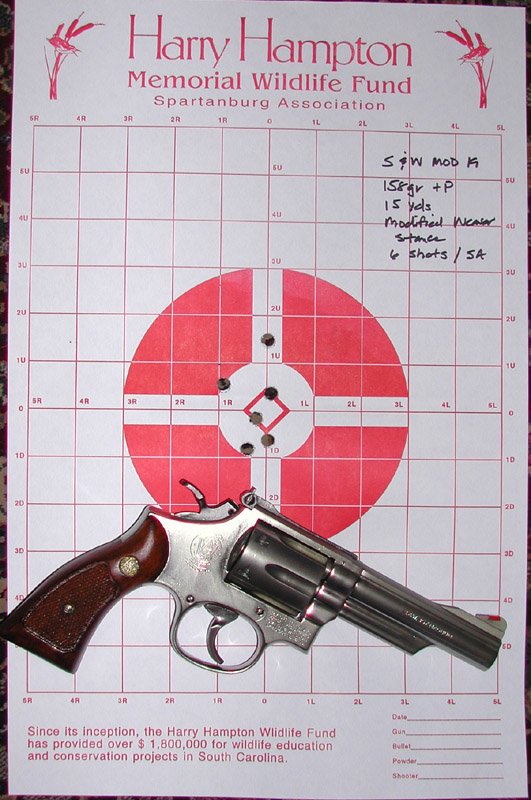
-
Okay, disregard my previous post. Here is another picture that clearly shows the barrel is split.
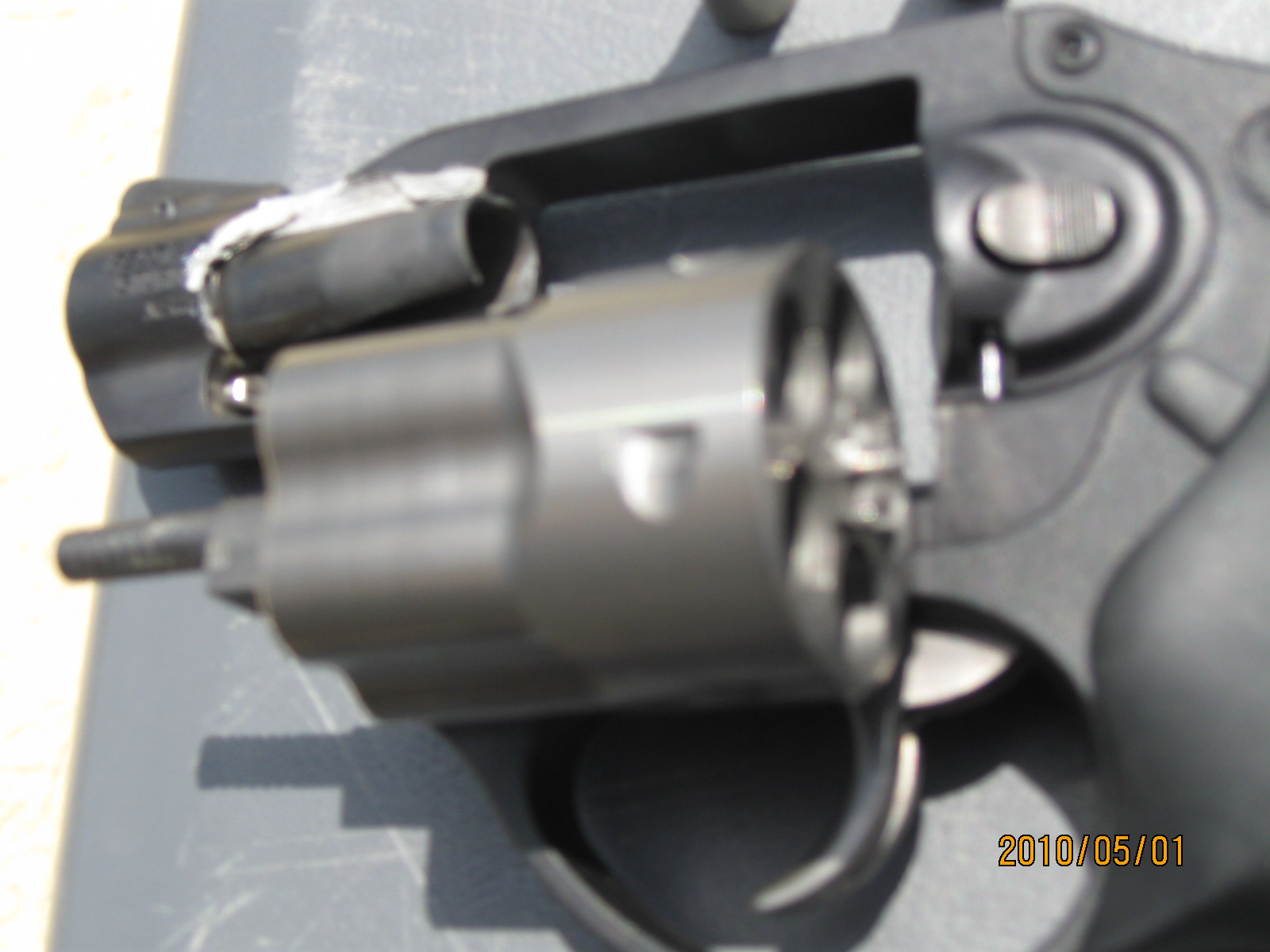
-

Look at where the frame failed: The barrel shroud. The steel barrel itself looks fine. Very strange.
-
-
That's really incredible that you were able to restore the finish that close to original. Are you going to leave it as-is now, or are you going to re-nickel?
Unless I see evidence down the road that the nickel has truly been compromised (i.e., more rust bleed through, or the nickel starts bubbling or flaking), I'm going to leave it alone. Of course, I'm going to keep it regularly wiped down with Ballistol. I won't ever abuse this gun again by letting it go without routine cleaning whether it's been shot or not.
Here's some better pictures to really show how good it looks now. The lighting on those other pics was off.
Before:

After:
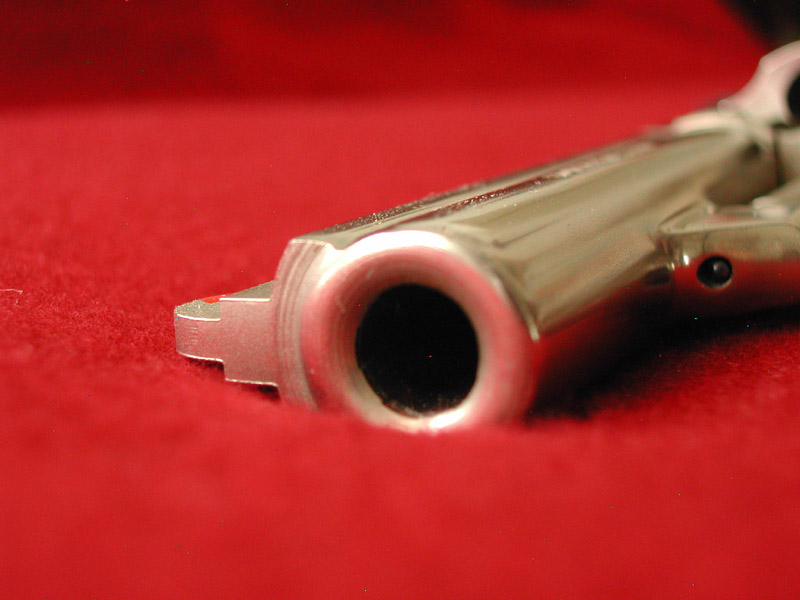
And here's a shot of the whole gun using different lighting. This better shows how the gun appears in person:
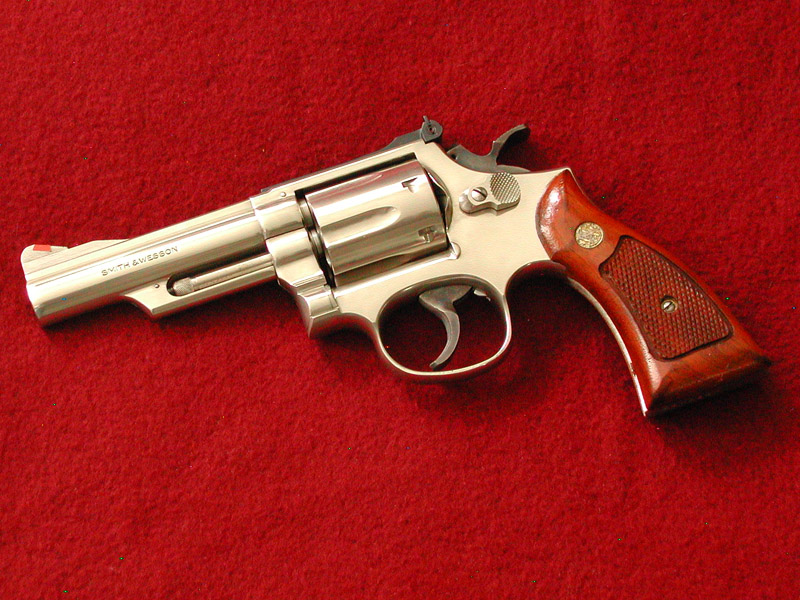
-
Several folks over on the S&W forum suggested that I try to rehabilitate the finish on my Model 19 with Flitz before going to the expense of a having it re-nickeled by S&W. I spent about 3 hours polishing yesterday and another 2 today and the rust spots are now gone and the frosted finish is about 95% back to the bright mirror finish it had some 30 years ago when it lured me into buying it. I went into the gun shop with every intention of buying a blued revolver but this one caught my eye. It was more expensive, but I've always been a sucker for nickeled revolvers.
I should have taken the "after" photo before I had rubbed it down good with Ballistol. This stuff clings so well it's impossible to wipe it down to be completely smudge free without using something to strip it off.
Anyway, here is what she looked like after being stored in a gun rug for the last 15 years:

And this is what it looks like after 5 hours of work with Flitz:

-
I think it is the top one, going by the grips and the fact that the front sight is set back slightly.
Yes, it's the top one. The front sight is the best giveaway. When Patton had the ivory grips made in 1940, he wanted his initials centered so the screw hole was offset. That's another discrepancy with the movie gun. However, I will say that the gunsmith who built the movie prop did a pretty good job otherwise.
-
Getting the Ruger LCR has rekindled my interest in revolvers, hence me digging out my Model 19 and taking my dad's old Dan Wesson to the range yesterday. It also rekindled my desire for an N-Frame 357 so I've been watching GunBroker for a Model 27 or Model 28 and I negotiated a deal for a Model 28 yesterday and pulled the trigger on a 28-2 with a 6" barrel.
S&W didn't assign model numbers to their guns until the late 50s, so the first 357s were simply called the ".357 S&W Magnum." When it was introduced in 1935 the 357 was a custom made to order gun with extensive hand assembly and fitting. Each one was shipped with a registration certificate and number in addition to the serial number. Hence, they are known today as "Registered Magnums." S&W stopped making the registered guns just before WWII and shifted the 357 to regular production.
One of the first 357 customers was Gen. George Patton. (The very first Registered Magnum was presented to J. Edgar Hoover by S&W.) Below is a copy of Patton's order for his 357.
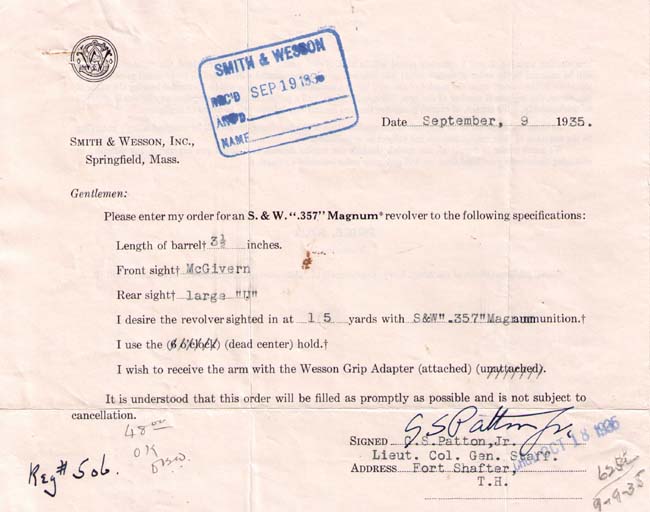
In this photo one revolver is Patton's real Registered Magnum. The other was built for the movie "Patton" staring George C. Scott and was used in the movie. Which is the real one?
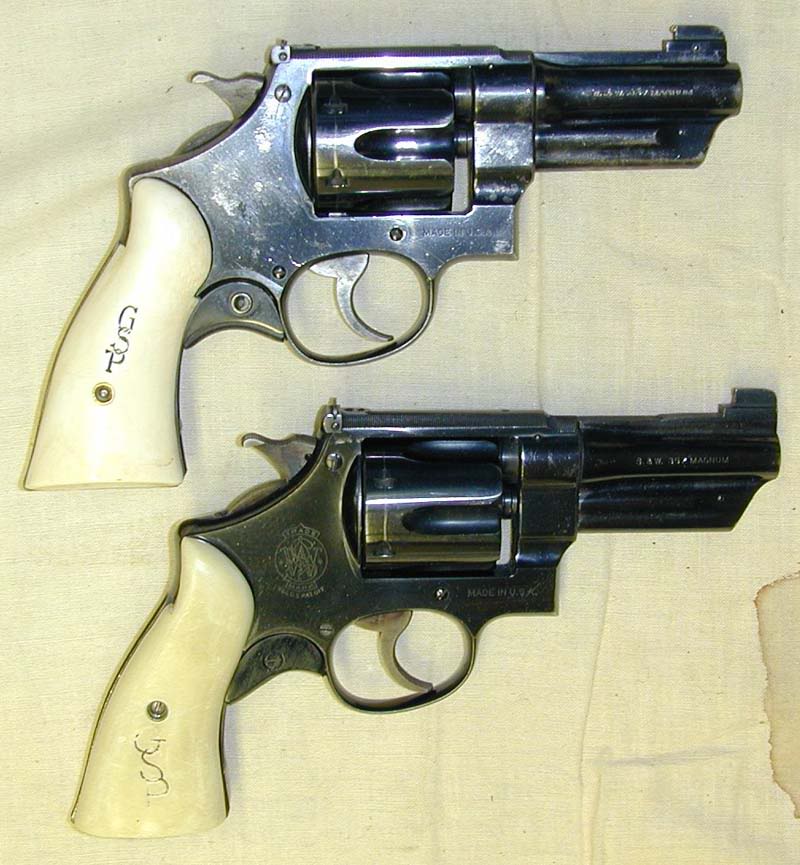
-
Some interesting observations from my time at the shooting range today: I took my dad's Dan Wesson 357 and shot it for the first time since before he died in 1984. I put a whole box of full-house 357s through it. Muzzle blast and recoil with the 4" barrel is about the same as shooting 38 +P loads in the LCR. 38 +P in the Dan Wesson was noticeably tamer, both in blast and recoil.
I'll post a range report on the DW later.
-
That's true Bill, but since flame cutting is a limited process, in that, once the material on the top strap is removed to a certain point the remaining material is far enough away from the gasses as to not be affected any longer unless hotter and hotter loads are used.
I've never bought into the "limited" theory of flame cutting. Watch any high-speed footage of revolver fire and look at how large the blast radius is coming from the cylinder-to-barrel gap. It's huge. On a 357 or 44 it goes out a good 4 to 6 inches.
-
-
Do you know what kind of loads were being fired in that? I am thinking super hot handloads?
The report was that he was using factory loads. And typically I would think an over pressure failure would result in a split cylinder. For the top strap to let go at the forcing cone, I think it had to be flame cutting. The scandium frame Smiths have a stainless steel insert on the top strap right there to prevent the hot gases from coming in contact with the alloy frame. I think the shield eventually burned through, or perhaps had accidentally been left off at the factory.
-
I posted in another thread that I was thinking about getting a scandium frame Smith. Maybe not...
I think anyone who owns an alloy frame revolver, no matter what make, needs to keep an eye on the top strap for flame cutting.

-
If you think 17.1 oz for a 357 is light, try the S&W 360PD. It's a scandium J-Frame 357, 1.875" barrel, titanium cylinder: 11.5 oz. Bet that sucker will rock your world with full-house 357 rounds. I'm actually toying with the idea of getting one. Or maybe M&P 360. It's got a stainless cylinder and is 13.3 oz.
The 38 Special LCR weights 13.5 oz and shooting 158 gr +P loads in it wasn't bad at all. I shot an entire box (50 rounds) in under 20 minutes with no ill-effects on my hand at all.
-
I called S&W this morning. A nickel refinish with return shipping is $274. Turnaround is 6-8 weeks.
-
The first handgun I ever bought was in 1979 and it was a Model 19-4, nickel, with a 4" barrel. When my dad passed away in 1984 I put a set of Model 10 grips on it and gave it to my mother for her personal protection. Like a dummy I traded the stock target grips for the smaller Model 10 grips, but Mom needed the smaller grips. I took my dad's Dan Wesson 15-2V and used that as my home defense handgun.
Now fast forward to 2010. I finally dug the 19 out of my mother's closet yesterday. The last time the gun was fired was before 1984 and the last time I remember cleaning it was sometime in the mid 90s. So for the last 15 or so years it's been zipped up in the gun rug. Needless to say, I was disappointed in what I found when I took it out of the rug. The once pristine mirror nickel finish is now completely frosted (except behind the grips) and there is noticeable rust showing through in several places.
 I have only myself to blame for letting the gun go this long without cleaning and oiling it.
I have only myself to blame for letting the gun go this long without cleaning and oiling it.Anyhow, I cleaned the gun good and then got online and I'll be calling S&W tomorrow to get the details on sending my 19 to them for refinishing. When I get it back I'll post some "after" pics for comparison.
Here are some pics of the 19 and the DW 15-2V:


In this next pic you can see some of the rust on the muzzle and ejector shroud:


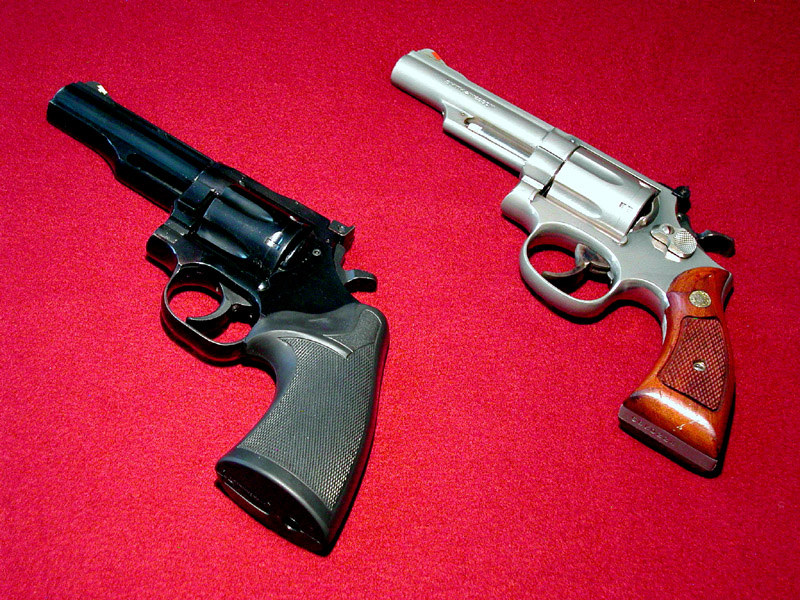
-
G-Man: You'll like that gun. It converted me from autos for CC.
I love it. It's so light I literally forget I'm carrying it.
BTW, Ruger just announced two new versions of the LCR: a 38 with smaller grips, and a new steel frame LCR in 357 Magnum. I always suspected a 357 was in the works because the cylinder on the LCR is 357 length, not 38 special.
-
Our newest member is somewhat of a YouTube celebrity, well-known and well-liked for his down-to-earth videos on guns, shooting, and living the good life.
Hickok45, welcome to Practically Shooting.
-
I took the LCR to the range today and put 50 rounds of 158 gr. SJHP 38 Special through it. It's a fun gun to shoot. Light as a feather, so these +P 38 loads feel like standard 357 Magnum loads feel in my Dan Wesson revolver.
I've never been a fan of double action (whether revolver or semi-auto pistol), and even though the DA trigger on the LCR is incredibly smooth and linear, I'm still going to have to practice a lot with this gun to get used to it. The target below is my first 20 rounds; 18 are on the paper. Range was 15 yards, Weaver stance.
Overall I'm quite pleased with the LCR. Its light weight is going to make it my primary carry weapon.
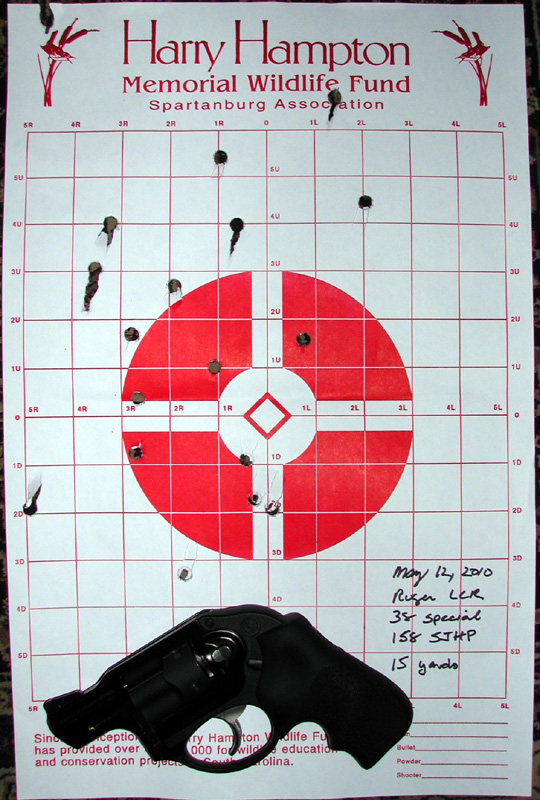
-
Looks good. I've got a hearing at noon tomorrow and I hope the court isn't back up because I want to take my new LCR to the range in the afternoon and sling some lead.
-
I got an Uncle Mike's inside the waist holster for the LCR, but I've discovered the easiest and best way to carry this thing is just sticking it inside my waistband with no holster.
Clark Gable's Registered Magnum
in Revolvers
Posted
Here is another Registered Magnum along with the registration certificate it came with: